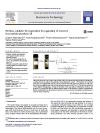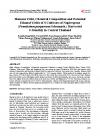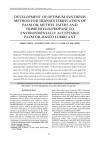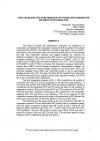Catalytic Deoxygenation for Upgrading of Leucaena

The aim of this study was to improve the quality of bio-oil produced from the pyrolysis of Leucaena leucocephala
trunks via catalytic deoxygenation using Pt/Al2O3 (Pt content = 1.32% (w/w)). The minimum
molar ratio of oxygen/carbon (O/C) at 0.14 was achieved when the amount of catalyst was 10% (w/w,
bio-oil) and was applied under 4 bar of initial nitrogen pressure at 340 C for 1 h. The reaction mechanism
of the catalytic deoxygenation, in terms of reforming, water–gas shift and dehydration reactions, was



